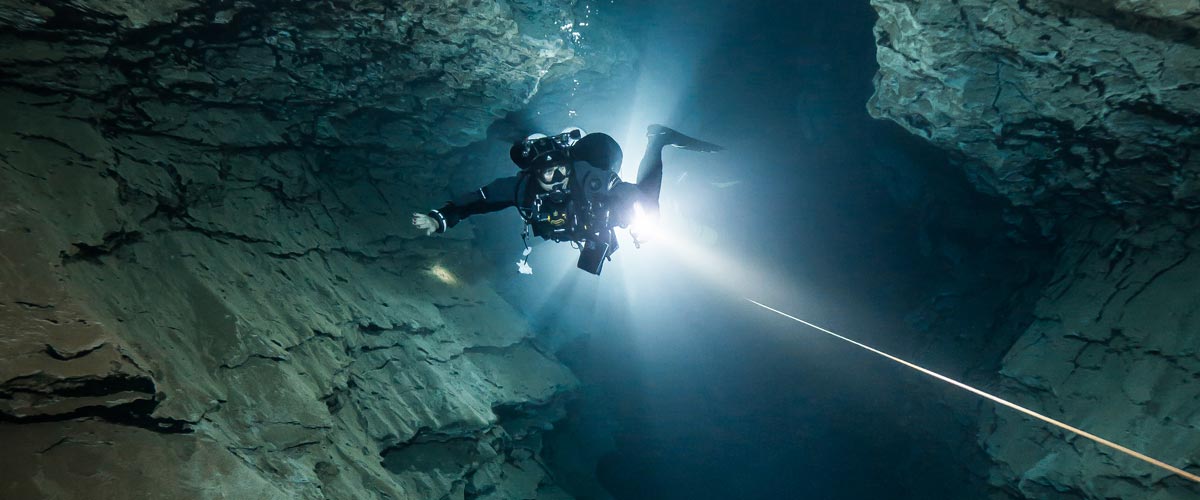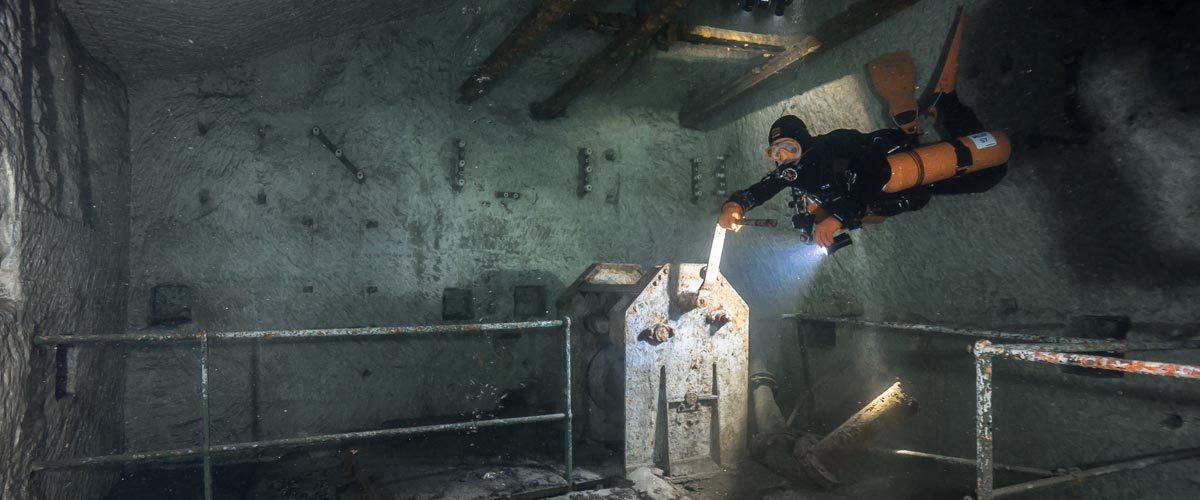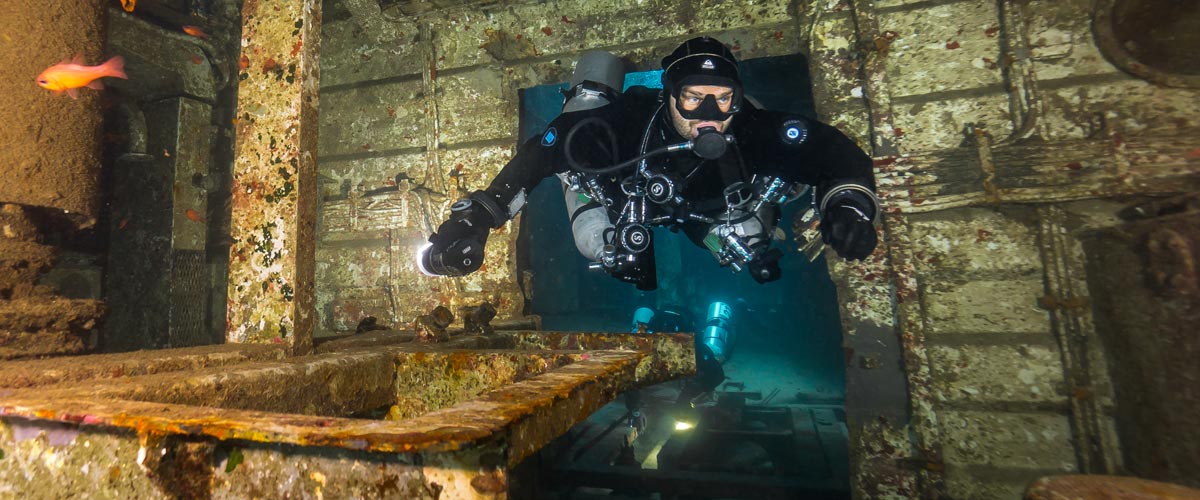Dive Training Blogs
Deptherapy returns to its Roots – Part 2
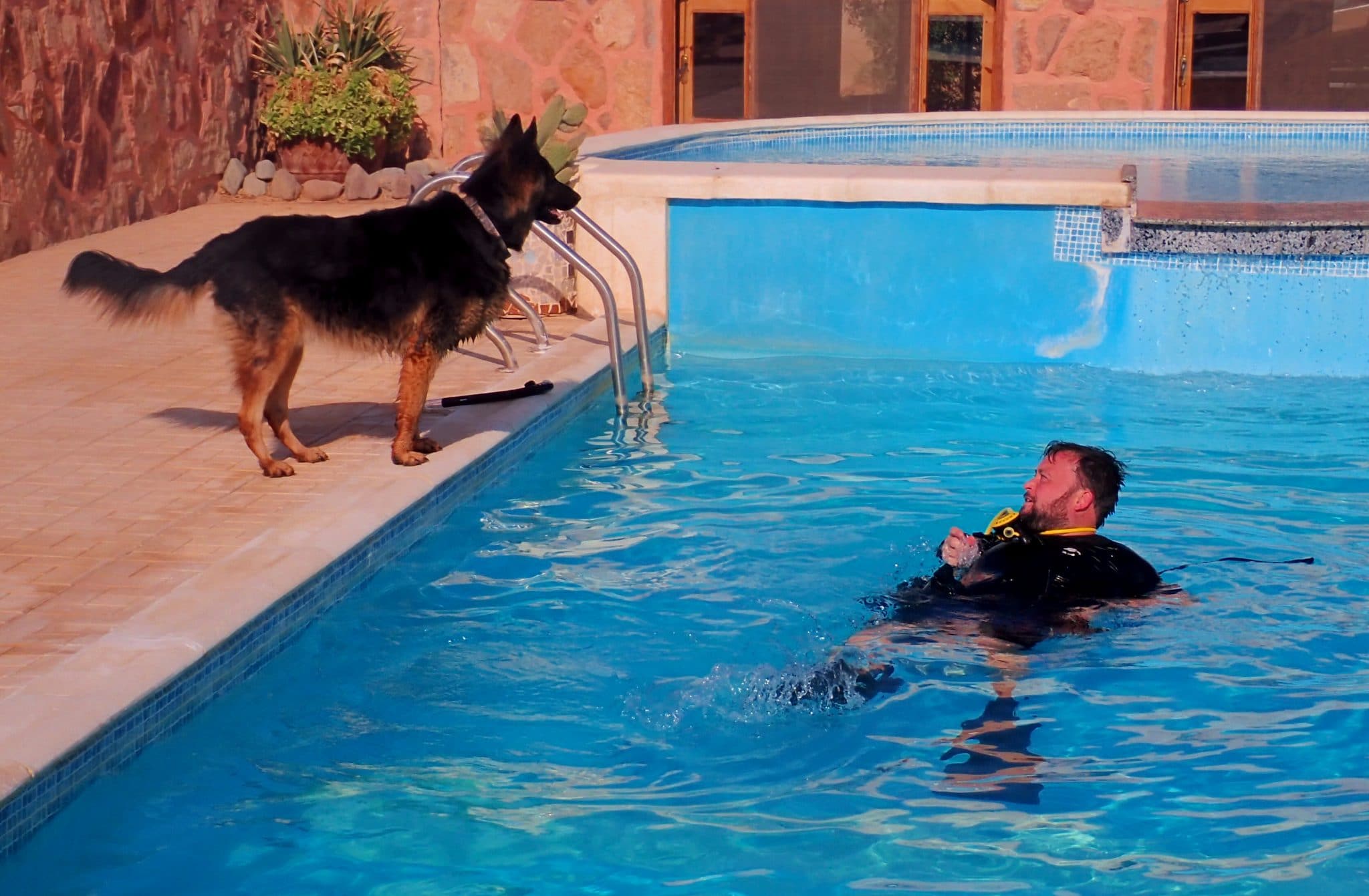
Join Richard Cullen from Deptherapy as we publish part 2 in his Blog about the charity’s recent expedition to Roots Red Sea, El Quseir, Egypt.
So here we are at Roots Red Sea, El Quseir, Egypt, and it is our first day of diving.
We have two students – Corey who is new to Deptherapy, and Keiron who is undertaking his RAID Master Rescue Course and has progressed from learning to dive with us. We also have three trainee divemasters: Tom Oates ‘Oatsie’, Tom Swarbrick ‘Swars’, and Michael. Each has progressed from OW diver with the charity.
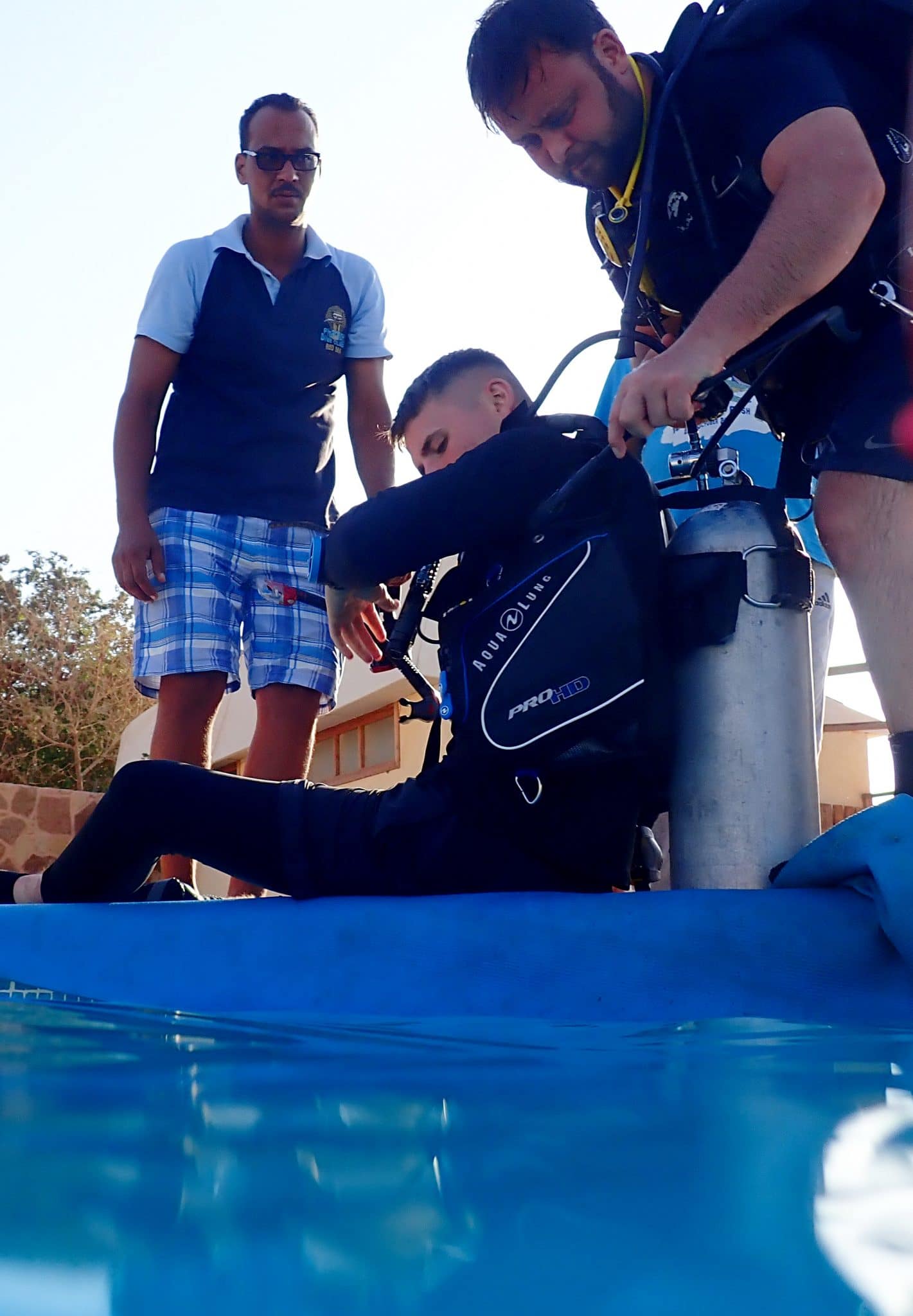
Michael prepares Corey for a deep water entry into the Roots pool
As all our programme members are open about their mental and or physical challenges these are the challenges they face:
Corey is 20 years old and was involved in a horrendous car accident while he was training to be a soldier with the Royal Anglian Regiment. The accident resulted in his spine being broken at T1 and T4. He is now paraplegic, unable to walk and he has no sensation in his legs.
Keiron was in the Scots’ Guards and served two tours in Afghanistan. He has Chronic PTSD.
Oatsie was in the Scots Guards and served one tour in Afghanistan. He has Chronic Complex PTSD.
Swars was in the Royal Anglian Regiment and he served two tours of Afghanistan. He has survivor guilt and Chronic PTSD from his first tour, and on his second tour he was shot by a sniper, losing five pints of blood and his life was saved by the excellence of battlefield medics. That tour compounded his PTSD.
Oatsie and Swars are both Deptherapy Ambassadors.
Michael was in the Royal Engineers and he has Multiple Sclerosis (MS) and Chronic PTSD. Michael is a Trustee of the charity and looks after Programme Member Liaison.
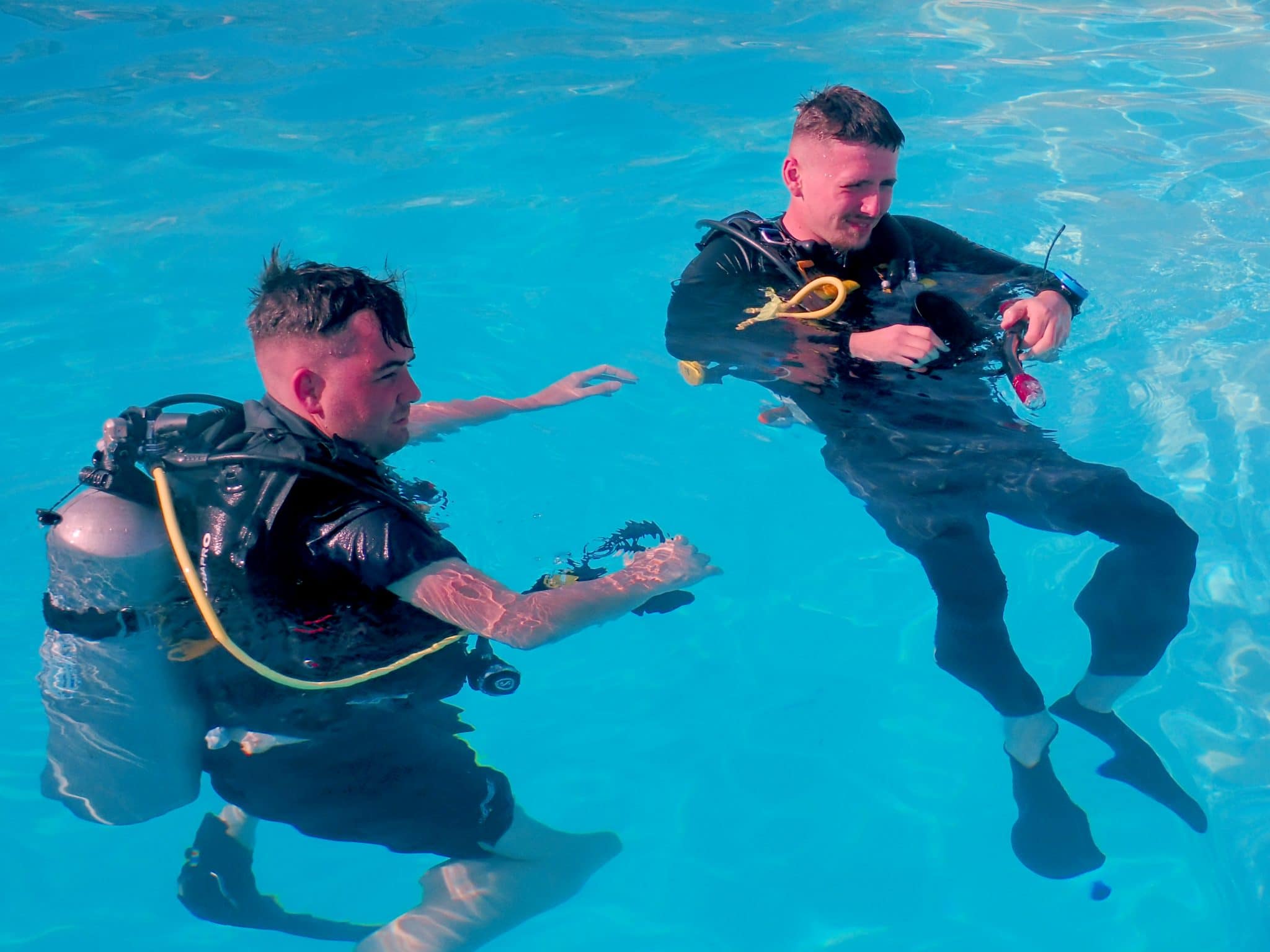
Corey and trainee divemaster Tom Oates in the pool
Every Deptherapy beneficiary has to undertake a ‘fit to dive’ medical with an HSE Approved Medical Examiner of Divers (AMED) or a Doctor who is a ‘Dive Referee’. A GP ‘sign off’ is not acceptable to Deptherapy as some conditions and medications are contraindicated to scuba diving.
After sorting out kit the whole team were required to undertake a Scuba Review as, with the exception of Michael and myself, none had been diving since last year.
Adaptive teaching requires a special mindset from instructors and divemasters. There are no experts in adaptive teaching, although some profess such expertise. Some, like myself, are very experienced in working with those who have a range of life-changing mental and or physical challenges, but we do not have all the answers. There are no “I know the answers” in adaptive teaching, every student is different, every student is an individual.
The huge danger is that ‘experts’ say I have already taught a paraplegic so teaching this paraplegic is the same; it is not!
The physical or psychological manifestation of the injury or illness is a mechanical issue, the skill is to see past the challenges and see the person you are working with – the real person.
Many have been living with their conditions for many years and have adapted to overcome the challenges that their injury or condition presents them with.
An example: Can you tie a neck tie using one hand? I bet not! I know two Deptherapy programme members who can do that and tie their shoelaces in the same way.
Your job, as an Instructor, is to allow the student to achieve the standards necessary for them to be certified as a diver. In Deptherapy we work to full mainstream certification; for us, the base is RAID Open Water Diver. We do not use the RAID Restricted Certifications of D1, D2, D3.
Veterans have a can-do mindset and very much want full certification and not a certification card that has the word ‘disabled’ on it. Do not look at what our beneficiaries achieve and think then that every person who wants to learn to dive and has a physical or mental challenge will apply themselves with such vigour. Veterans are used to ‘drills’ so skills are easy for them to learn and to master.
It’s important not be afraid to ask the student “This is what you have to do to achieve the required standard for a skill and ask how they might perform that skill.”
So, we prepared for the pool! Keiron is a known quantity for us, he is a good diver who had completed all his RAID on-line learning, quizzes and the final exam. Corey was new to us having qualified as a PADI Open Water diver on a trip to the Florida Keys with another charity last year.
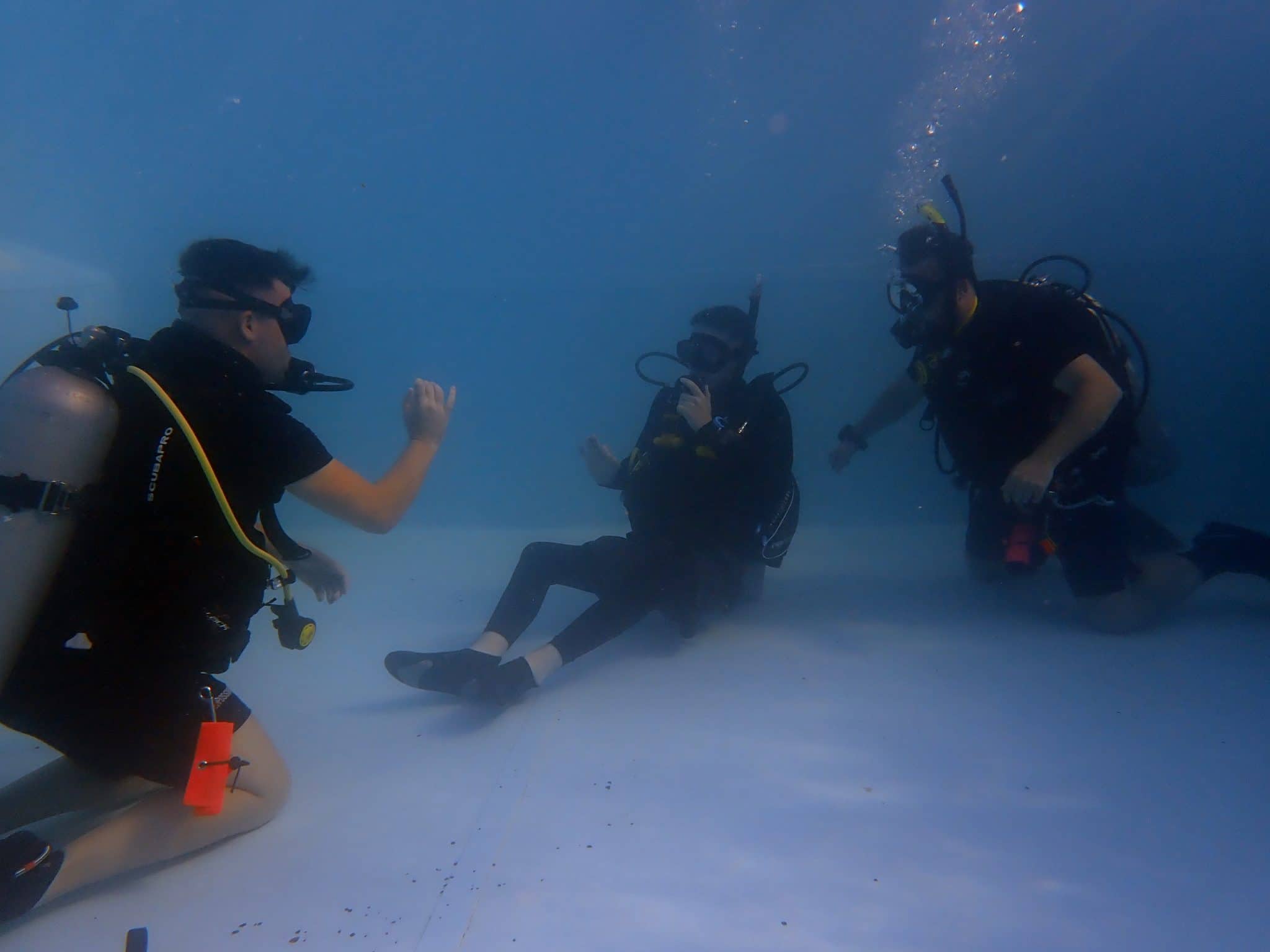
Oatsie asking if Corey is OK during the RAID OW 20 Confined Dives skills
Our intention was to put Corey through his RAID Advanced 35 Course. He had completed all the online learning, and passed the quizzes and exams. Corey is a lovely person; he has a great personality and a determination to succeed in everything he does. As a person, the whole team absolutely loved him.
When kitting up and about to complete a deep-water entry into the pool it became clear that Corey, who is a bright young man, had never carried out some of the skills to the standard required to be an Open Water Diver. We therefore decided to take him through the RAID OW 20 Confined Water dives with our TDMs Oatsie and Michael, who have excellent skill demonstration abilities, running the sessions under my close supervision.
While Oatsie and Michael worked with Corey on Day 1, Swars worked with Keiron whose instructor was Moudi, the Roots General Manager and a very experienced instructor, through the pool dives of the RAID Master Rescue Course.
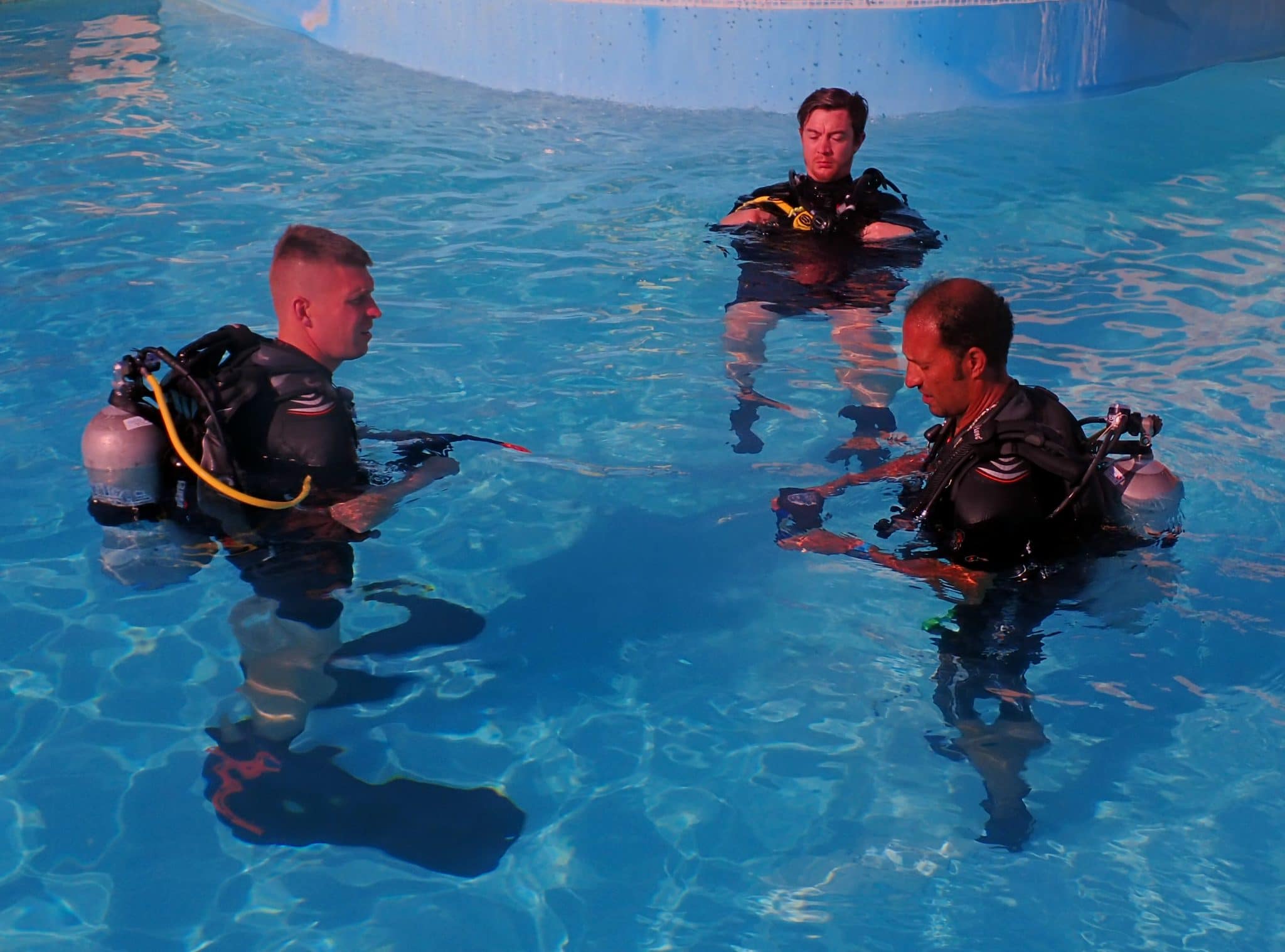
Keiron, trainee divemaster Tom Swarbrick, and instructor Moudi in the pool
For those with physical challenges such as paraplegia or missing limbs, weighting becomes of absolute importance. Paraplegics who have no sensation or movement in their legs swim with a leg down posture. If not balanced with correct weighting they swim underwater in an upright position and not horizontally. Corey assumed this upright position. In Deptherapy we use ‘Bright Weights’ that are attached to the BCD at chest level to help get the student in a horizontal position. Corey had never done a forward descent but had done ‘legs down’ descents and had only dived with support.
Michael and Oatsie did a tremendous job in building up Corey’s skills and confidence. Deptherapy has very high standards when it comes to qualifying divers and we insist on pushing boundaries. Because of the negative stance that many in the diving industry take about divers with disabilities, our expectation is that our students will exceed the required standards.
An Instructor who shows pity or sympathy for a disabled individual and allows them to qualify as divers when they clearly have not met the required standards firstly puts that student at risk, it puts their buddy at risk, and it damages the reputation of all those disabled divers across the world who have met the required standards.
Despite starting from a low base, our determination was by the end of the week to turn Corey into a more than competent RAID Open Water Diver capable of safely being an independent diver, diving with and being able to support a buddy if they required assistance.
Corey, being Corey, accepted the challenge and knew that he had a lot to do. It says a lot about this young man that he faced the challenge square on.
Keiron meanwhile had successfully navigated his way through his confined water dives.
A relaxing and positive evening followed where everyone got to know each other and to talk openly about their challenges and how they dealt with them.
Check back tomorrow as we move to our first day of Open Water training on the magnificent Roots’ House Reefs.
Find out more about the work of Deptherapy and Deptherapy Education at www.deptherapy.co.uk
Blogs
Intro to Tech: What is it about?
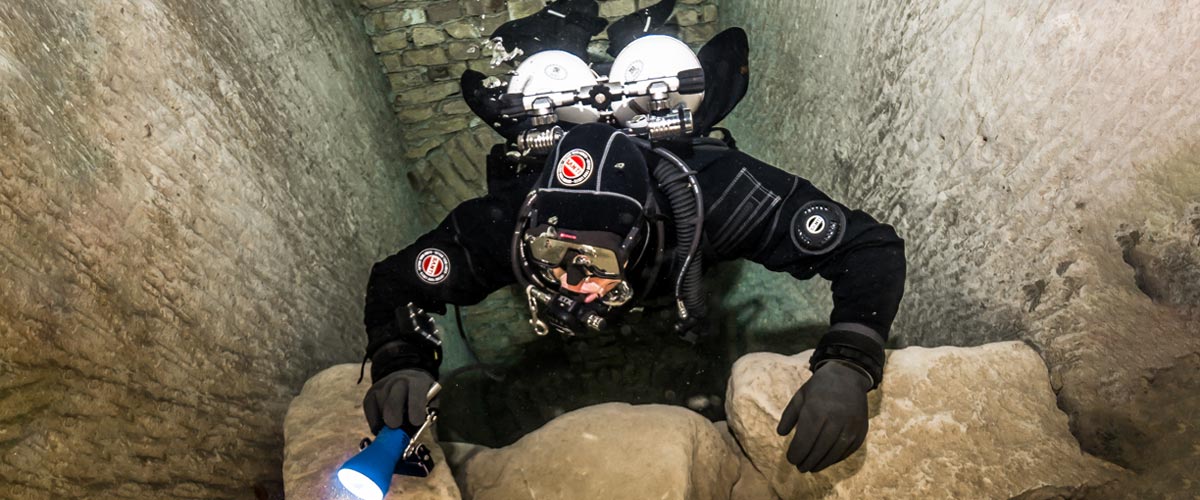
Article by José Pablo Mir
Pictures by Cezary Abramowski
The world of technical diving is exciting. It opens the door to new sites, depths, and bottom times. More importantly, it opens our minds to a new way of planning, facing, and experiencing dives, even those not purely technical.
Becoming a technical diver is a process, and like in other aspects of life, we should find the proper entry point that suits us best based on our knowledge and experience. The Introduction to Technical Diving course from TDI -the world’s largest and most recognized technical diving teaching organization- is the best option for divers who have yet to gain experience in the fundamental aspects of this new practice. The course’s content and its embrace of new techniques and technologies make it possible to acquire a solid foundation to learn and gain experience in this practice properly.
Becoming a technical diver is not something that happens overnight, whether deciding to become one or receiving a certification card stating we are now technical divers. It is a slow process extending farther away than any introductory course. It requires effort and dedication. But it will bring us satisfaction from day one -or two.
It is a matter of mentality
First, we must understand and accept that technical diving, involving greater depths, longer bottom times, exotic gases, virtual or real ceilings, and more, comes with higher levels of risk than the sport diving we have been practicing until now.
Although this discussion usually starts with a warning about risks, as I’ve done in the previous sentence, our practice is not a game of chance.
Technical diving is a rational activity that requires maturity and good judgment, and we will put everything into ensuring that each dive is a successful one -meaning we return from it safe and sound. With this understanding, we will strive to establish a mental attitude more aligned with our practice and its realities.
This new “technical diver” mindset we will develop will lead us to be more cautious in our executions, more analytical in our plans, more rational in our strategies, and more detailed in our procedures.
Experience will keep teaching us to know ourselves better, to keep our anxiety and other emotions under control, and to manage our impulses. Over time, our senses will sharpen, and we will be more attentive to the particulars of the situation we find ourselves in.
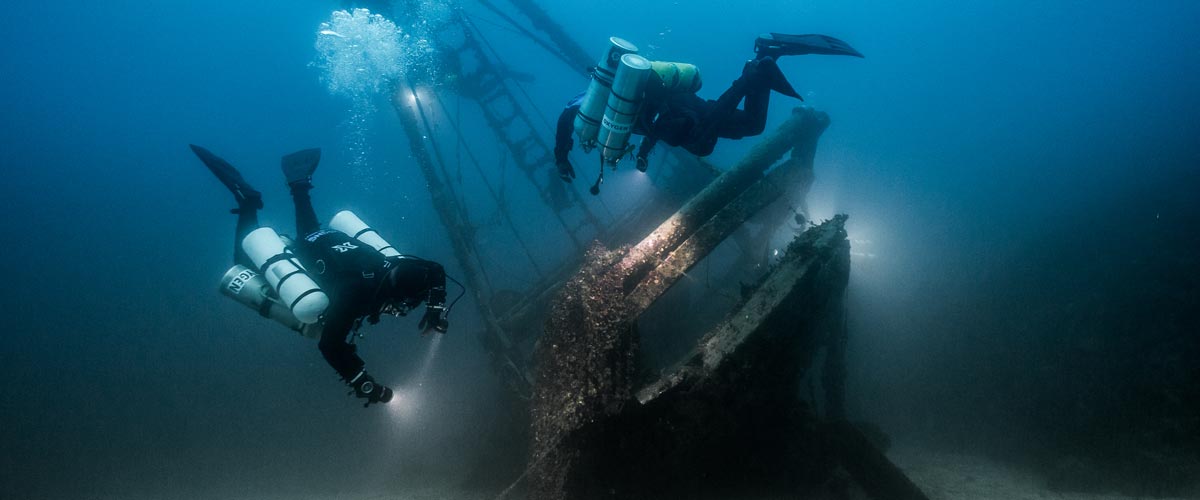
Strategies and procedures
Our strategies, those broad guiding lines tracing the path to follow, from how to approach planning to where, with what, and how we are willing to get there, will be more specific and more practical. Not because they magically become so, but because we will consciously and deliberately frame them that way.
We will establish clear, concise, and realistic procedures. Not only for the undesirable situations that may present themselves but also for those that are part of our dive objectives.
Even though, as technical divers, we often use equipment different from what we were previously accustomed to, it is essential to note that the gear does not make the diver. In a way, we could consider such equipment as the necessary tools to implement what our goal seeks to achieve, according to our strategies and procedures.
Technique plays an important role
We must put our greatest effort into learning and perfecting the different techniques we will be acquiring. Buoyancy, trim, propulsion, cylinder handling, deploying DSMBs and lift bags, valve drills, and more are essential skills we must begin to master to progress in our art. What we cannot do, when we need to do it, can harm us.
Our techniques must be effective and achieve the purpose for which they were devised. But they must also be efficient and require the least resources possible, including the time they take and the effort they demand. Effectiveness and efficiency will prevail over beauty and other considerations that may come to mind, although none of them should be mutually exclusive. A technique executed efficiently and effectively tends to have an inherent beauty.
Refining techniques is a lifelong mission. Some of them will be easy to master from the go; others, on the other hand, will be our life mission and will require many repetitions just to resemble the idea we have in mind of how they should be executed.
We must consider the environment
Our learning, the needs and musts of the practice we engage in, the experience we gradually gain, our strategies and procedures, and even our equipment and tools change with the environment.
Diving in the ocean, everything about us must be suitable for ocean dives. Conditions there rarely emulate those found in a pool, lake, or river. Variable winds and currents, greater depths, visibility conditions, other divers with uncertain skills around us, marine life, maritime traffic, distance from the coast, and many other factors add complexity and uncertainty.
It is never necessary to master the pool on the first day, but planning and aspiring to gradually cope with the ocean’s conditions is essential.
The cost of good training
We are aware that our resources are often scarce in relation to the possibilities of use we could give them if they were not. To a greater or lesser extent, we are part of the economic reality in which we are embedded.
Fortunately, the cost of good technical diver training is not an entry barrier. Comparing training and equipment costs, we see that the former are generally lower. Yes, lower cost for personalized service, essential to our future
performance and safety, than for a series of mass-produced products that are mere, albeit necessary, tools for an end.
The value of good training
The value of the training we received encompasses a range of characteristics, from emotional and methodological to technical and technological. TDI and its Introduction to Technical Diving course offer a deep and modern approach, with a teaching strategy that aims to create thinking divers, not merely obedient ones.
As technical divers, our knowledge is our primary tool. In this type of activity, what we don’t know can harm us.
Is this course optional?
Unfortunately, the fact that this Introduction to Technical Diving course is not a prerequisite for any subsequent training is an invitation to consider it optional. And we all know what usually happens to “optional” under budget constraints.
However, this course should be seen as optional only by those divers who are somehow familiar with the use of technical equipment, who have a mindset more in line with the requirements of this type of diving, who plan and execute the dives the proper “technical” way, who know their gas consumption rate, who are not intimidated by non-decompression tables, who feel comfortable using their dive computers, and know the techniques and have at least an acceptable level of buoyancy, positioning, and propulsion. Those can go straight to a more advanced training course, such as TDI’s Advanced Nitrox.
We must ask ourselves whether or not we are in that group.
Remember our goal: to have fun
Recreational diving is our passion. Jumping into the water carrying heavy equipment and having properly dotted our I’s and crossed our T’s have only one ultimate goal: fun. This is the activity we have chosen as a hobby. We must enjoy it; it must give us pleasure and make us vibrate.
Having a good time is not optional!
Blogs
Four opportunities to go pro in 2024 with Dive Friends Bonaire
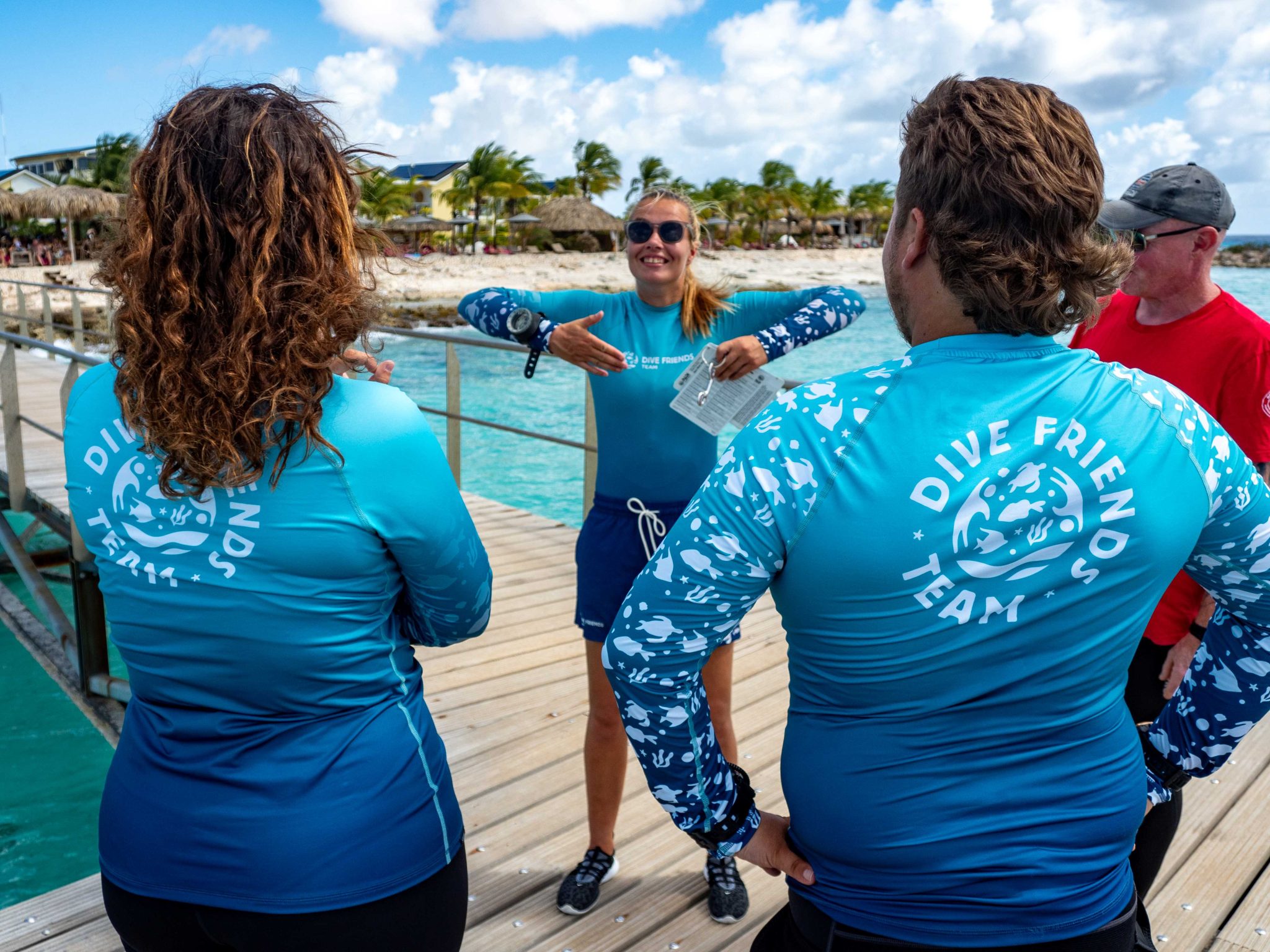
Dive Friends teaches the Instructor Development Course (IDC) several times a year to students who are eager to share their passion for diving with the world.
Dive Friends is known for the personal approach throughout the course. Their in-house course director will lead the students through every essential step, mentoring them to achieve their fullest potential as a dive instructor.
Applications for the following IDC start dates are now open:
- 12 April
- 5 July,
- 20 September
- 29 November
Partnership with Casita Palma
If the student opts for the IDC-Deluxe or IDC-Supreme package, their accommodation will be arranged for them at Casita Palma. This small and quiet resort is within walking distance from Dive Friends Bonaire’s main dive shop location and has everything you need to relax after an intense day of IDC training. Breakfast is included, so the student will always be fuelled and ready for their day.
Contact Dive Friends Bonaire’s Course Director Eddy for more information: coursedirector@divefriendsbonaire.com.
-

 News3 months ago
News3 months agoHone your underwater photography skills with Alphamarine Photography at Red Sea Diving Safari in March
-

 News3 months ago
News3 months agoCapturing Critters in Lembeh Underwater Photography Workshop 2024: Event Roundup
-

 Marine Life & Conservation Blogs3 months ago
Marine Life & Conservation Blogs3 months agoCreature Feature: Swell Sharks
-

 Blogs2 months ago
Blogs2 months agoMurex Resorts: Passport to Paradise!
-

 Blogs2 months ago
Blogs2 months agoDiver Discovering Whale Skeletons Beneath Ice Judged World’s Best Underwater Photograph
-

 Gear Reviews2 weeks ago
Gear Reviews2 weeks agoGEAR REVIEW – Revolutionising Diving Comfort: The Sharkskin T2 Chillproof Suit
-

 Marine Life & Conservation2 months ago
Marine Life & Conservation2 months agoSave the Manatee Club launches brand new webcams at Silver Springs State Park, Florida
-

 Gear Reviews3 months ago
Gear Reviews3 months agoGear Review: Oceanic+ Dive Housing for iPhone















